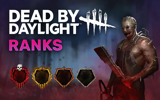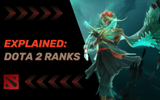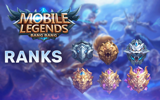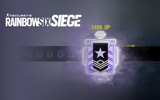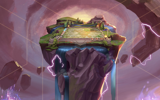League of Legends Ranks (What are All the Ranks)
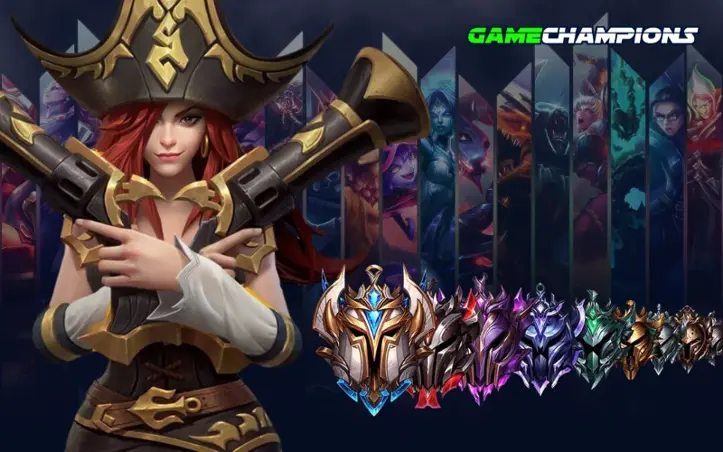
The matchmaking rating (MMR) lies at the core of the League of Legends ranking system, calculating your skill level based on wins, losses, and performance. Let's take a look at how it works and why it plays such a large role in determining your rank.
League of Legends Ranking Explained
Let's first understand what MMR is, and how it impacts your climb as you gain or lose League Points.
What is MMR?
MMR (Matchmaking Rating) plays an essential role in determining how many League Points you gain or lose after each match. It represents your hidden skill rating behind the scenes and influences matchmaking by pairing you with players of similar MMR.
When your MMR is higher than the average for your current rank, you'll gain more LP for victories and lose less for defeats. This is because the system believes you belong in a higher rank and is trying to accelerate your climb. On the other hand, if your MMR is not keeping up with your rank, winning games grants less LP while while losing games will deduct more.
The whole point of MMR is to align your rank with your actual skill level.
Earning and Losing LP
Players earn or lose LP (League Points) based on their performance in Ranked games. LP serves as a measure of progress within the ranked system. Winning a game will grant you LP, while losing will cause you to lose some.
The number of LP gained or lost depends on various factors, such as the skill level of your opponents and teammates, as well as your own individual performance. If you win over players with higher rank and/or MMR, you'll receive more League Points.
If you're still not sure, check out the quick guide below:
Placement Games
When starting out with ranked, you'll first have to play your placement games. These initial matches will determine which rank and division you will start your climb from.
Placement games take several factors into account when determining your rank placement. While win-loss ratio plays a significant role, individual performance is also considered. So even if you don't win all of your placement games, performing exceptionally well can still boost your chances of landing in a higher rank.
Promotion and Demotion between Divisions
League Points not only reflects your progress but also determines whether you are eligible for promotion or at risk of demotion between divisions within a tier. Each tier up to and including Diamond consists of four divisions.

To be promoted from one division to another within a tier (e.g., Silver III to Silver II), players must get 100 LP and then win two out of three games in the upcoming promotional series. Successfully doing so will advance you to the next division.
On the other hand, if your LP drops too low within a division and reaches zero points, you'll enter into a “demotion series” where you need to win two out of three games to avoid being demoted to the previous division.
LoL Ranks in Order (Each Rank Explained)
The ranking system starts with Iron, followed by Bronze, Silver, Gold, Platinum, Emerald, Diamond, Master, Grandmaster, and finally Challenger.
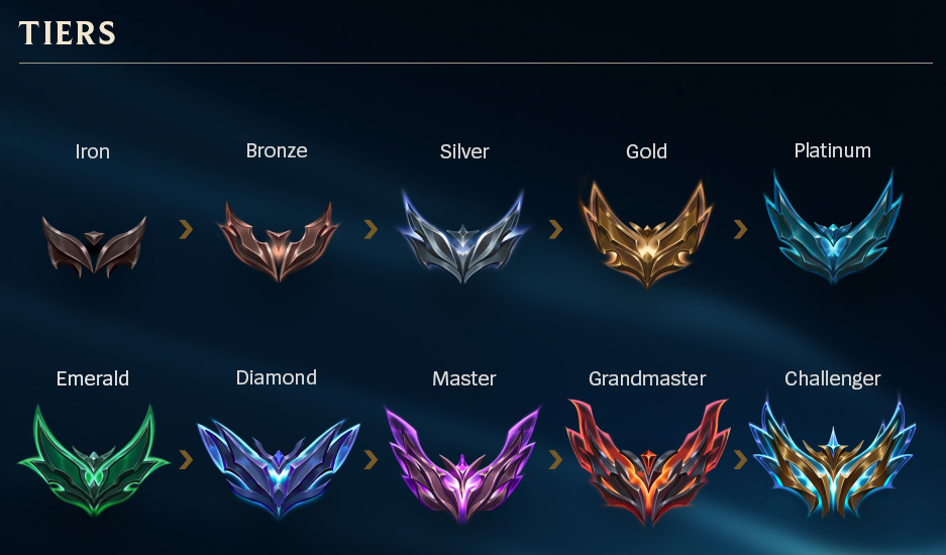
Let's take a look at what to expect from players in each rank and how to consistently win those games.
Iron:
- Players are bad at the game.
- Build foundational skills like CSing, pathing, and warding.
- Pick easy-to-use champions like juggernauts.
- Avoid grouping too much, focus on split pushing.
- Prioritize objectives like dragons, Rift Heralds, and Barons.
Bronze:
- Mechanics start to improve slightly.
- Emphasize laning skills and punishing opponents' mistakes.
- Continue split pushing and limiting fights to 2v2s and 3v3s.
- Stick to easy-to-use champions.
- Force objectives assuming the enemy team won't check.
Silver:
- Players are becoming better but still lack map awareness.
- Team fighting becomes more common, but split pushing is still effective.
- Focus on individual mechanics to win games.
- Continue using simple champions.
- Keep forcing objectives assuming lack of enemy awareness.
Gold:
- Macro and wave management start to improve.
- Play styles and preferences become more significant.
- Facilitate teammates with utility or engage picks.
- Keep picks simple and easy to use.
- Adapt to a more varied skill level in Gold.
Platinum:
- Players are generally a step up from Gold in all aspects.
- Mechanics, macro, and core concepts are more refined.
- Focus on improving specific game knowledge and mechanics.
- Grind games and work on mechanics to climb.
Diamond:
- High level of skill in mechanics and game knowledge.
- Teamwork and communication become crucial.
- Coordinate with teammates for invades, dives, and objective control.
- Out-macro opponents with coordinated movements on the map.
Master and beyond:
- Mechanics are on par with pro players.
- Focus on mental fortitude becomes crucial.
- Combat toxicity and tilt for better performance.
- Play every game to win and avoid giving up early.
Player Distribution Across Ranks
The distribution of players across ranks in LoL follows a bell curve pattern commonly observed in many competitive games. This means that there are fewer players at both extreme ends (Iron and Challenger) and a higher concentration of players in the middle ranks (Bronze, Silver, Gold, Platinum).
|
Rank |
Player Distribution |
|
Iron |
7.8% |
|
Bronze |
18.95% |
|
Silver |
21% |
|
Gold |
22% |
|
Platinum |
16% |
|
Emerald |
11% |
|
Diamond |
2.7% |
|
Master |
0.46% |
|
Grand Master |
0.06% |
|
Challenger |
0.03% |
The majority of LoL players fall within the lower ranks (Bronze-Gold)
*It's important to note that player distribution can also vary depending on region and game mode.
Ranked Queue Restrictions
If you're looking to group up with friends, first make sure that you're not restricted!
Duo Queue
The image below shows which tiers are able to duo together:
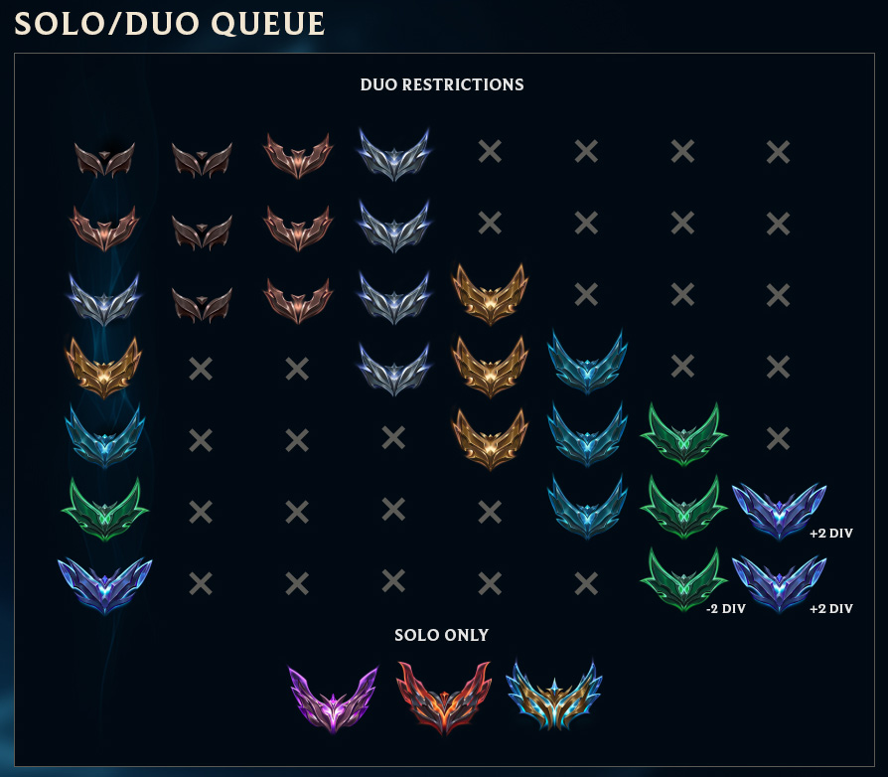
Flex Queue Restrictons
For the higher tiers in Flex Queue, certain restrictions apply:

Rank Decay
Decay is another aspect of the ranking system that applies specifically to Diamond IV or higher. It serves as an incentive for high-ranked players to remain active in order to keep their rank.
If a player reaches Diamond IV or above but fails to play any ranked games for an extended period, decay starts setting in. Essentially, decay chips away at their LP over time until they either start playing ranked matches again or drop out of Diamond IV.
The intention behind decay is clear - it ensures that only actively participating players occupy the top spots in the rankings. This prevents individuals from reaching high ranks and then becoming inactive, effectively blocking other aspiring players from climbing up the ladder.
AFKs and Remakes
Having teammates who go AFK (Away From Keyboard) or disconnect during a match can significantly impact your chances of winning.
To mitigate these frustrations caused by AFK players or disconnects, Riot Games has implemented various measures over time. These include harsh penalties for intentional AFKing or leaving games early and the lovely Remake system that lets you type /Remake at the 3-minute mark of the game in case a teammate is AFK. This lets you out of the game without any LP or MMR penalty.
We hope that our guide helped you in your climb towards the top of the rank.
See you on the Summoner's Rift!






